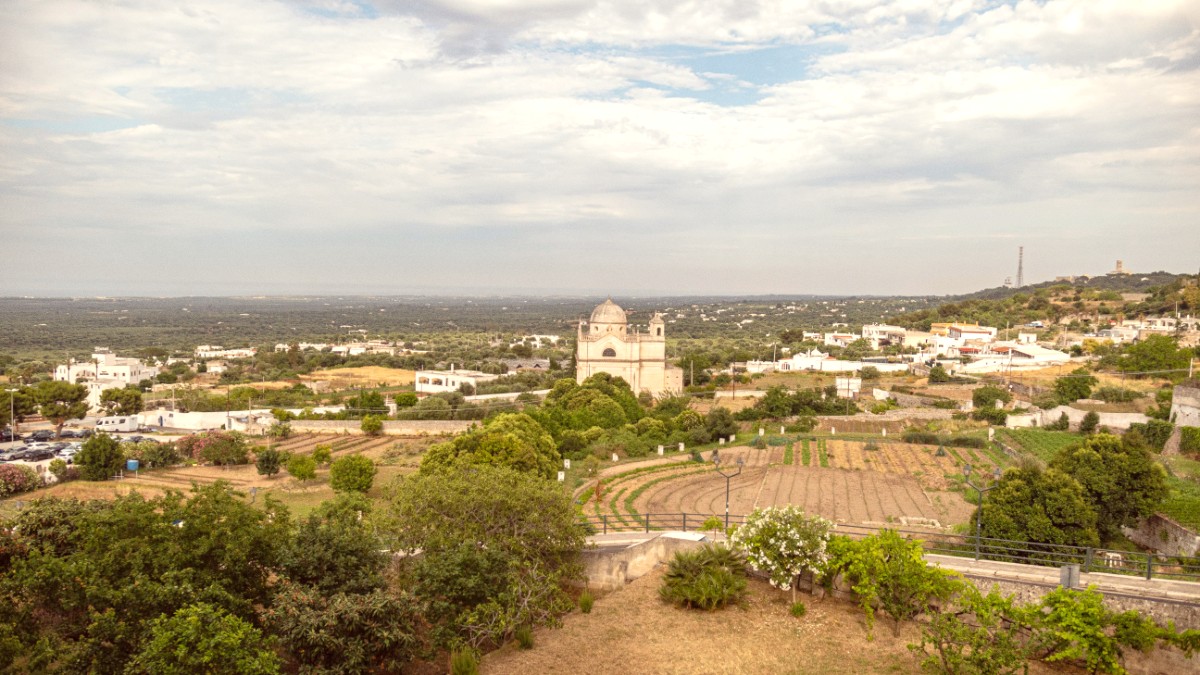
Puglia, Italy
Puglia's fertile land produces a wealth of ingredients that form the basis of its simple yet flavorful cuisine.
Olive Oil: Puglia is Italy's largest olive oil producer. Vegetables: Look for dishes featuring Fave, Cicorie, Broccoli rabe, and ripe tomatoes. Legumes: Lentils and chickpeas appear frequently in soups. Pasta: Orecchiette is the iconic pasta. Herbs: Oregano, basil, and mint frequently flavor dishes.
Lunch (Pranzo) is typically from 1:00 PM to 2:30 PM. Dinner (Cena) starts around 8:00 PM and can last until 10:00 PM or later, especially in summer. Many restaurants close between services.
Espresso is consumed quickly, often standing at the bar. Cappuccino is a breakfast drink. Local wines like Primitivo and Negroamaro are popular.
Bread is usually served with meals, often with a "coperto" (cover charge). Do not use the bread plate for olive oil. Tipping is less ingrained than in North America.
This iconic dish features ear-shaped pasta with sautéed turnip tops, garlic, chili, and sometimes anchovies. It is a true regional classic.
Find it in almost any traditional Trattoria.
A creamy fava bean purée served with sautéed wild chicory. This simple, hearty, and ancient dish stands as a perfect example of Cucina povera.
Traditional restaurants commonly serve it.
Octopus cooked slowly in a terracotta pot with tomatoes, garlic, and herbs. This is a coastal specialty, featuring fresh seafood.
Seek it in seafood restaurants near the sea.
Pasticciotto Leccese is a small, oval-shaped pastry filled with custard cream. Cartellate are fried pastry ribbons drizzled with Vincotto or honey.
Puglia makes robust red wines like Primitivo and Negroamaro. Limoncello is a sweet lemon liqueur. Caffè in ghiaccio con latte di mandorla is iced coffee with almond milk.
Ostuni has several restaurants with refined Puglian cuisine. These places frequently boast elegant settings, sometimes with panoramic sea views from rooftop terraces.
Numerous Trattorias and Osterias give authentic local dishes at reasonable prices. These places give a welcoming atmosphere and a true taste of Puglia.
Ostuni has several budget-friendly dining spots and street food options for quick, tasty, and economical meals.
The Mercato Settimanale (Weekly Market) on Saturdays offers fresh produce and local items. It is a great place for local life.
The Mercato Coperto (Covered Market) has fresh produce, cheese, and meats daily.
While Puglian cuisine is main, some restaurants may have pizza or generic Italian options for broader tastes.
True international cuisine (e.g., Asian, Mexican) is limited, as the focus stays on regional specialties.
Lunch (1-2:30 PM), Dinner (8-10 PM+). Many close between.
Espresso standing at bar. Cappuccino is a breakfast drink.
Embrace local Puglian varieties for value and taste.
Less common than in North America; check Section 2.3 for details.
Halal options are generally not readily available in Ostuni. Travelers with these specific dietary needs should plan to self-cater or research specific ingredients in advance.
Check for international supermarkets in larger cities like Bari if self-catering Halal.
Kosher options are also not readily available. Similar to Halal, self-catering or prior research on ingredients and preparation methods is advised.
Specialty food stores may exist in larger cities for specific Kosher items.
Research restaurants in advance using online reviews that mention dietary accommodations.
If you have severe allergies, consider staying in a vacation rental with kitchen facilities.
Several local operators give Puglian cooking classes. These frequently focus on making Orecchiette pasta, Focaccia, or other traditional Apulian dishes.
Guided tastings at local olive oil mills (Frantoi) teach you about different olive varieties and production methods.
Many Masserias and wineries in the countryside give tours and tastings. Learn about the winemaking process and the region's viticultural heritage.
Christmas brings Cartellate and Purceddhruzzi. Easter has Scarcella. Summer means abundant fresh seafood, watermelon, and figs. Look for seasonal vegetable dishes.
Always ask about seasonal specials for the freshest local tastes.
Many Ostuni eateries prioritize locally sourced ingredients, supporting regional farmers and sustainable practices. Inquire about farm-to-table initiatives.
Choosing restaurants that highlight local produce contributes directly to the regional economy and food heritage.
The cuisine emphasizes fresh, seasonal, and locally sourced ingredients, reflecting the region's resourcefulness.
Orecchiette (ear-shaped pasta) is the most iconic pasta of Puglia, often handmade by locals.
The "cucina povera" philosophy is foundational, making simple ingredients shine in hearty dishes.
Do not miss trying the locally produced Burrata and Ricotta forte cheeses. They are regional dairy specialties that truly capture the taste of Puglia.